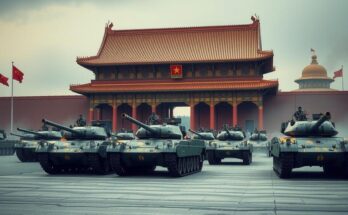On March 18, 2025, 42 human rights organizations called for the UN to renew its special rapporteur on Iran to address ongoing human rights violations, as reported by a fact-finding mission. Hilary Power emphasized the urgent need for accountability in light of severe and discriminatory acts by Iranian authorities, including rampant executions and repression of dissent both domestically and internationally.
On March 18, 2025, forty-two Iranian and international human rights organizations urged the United Nations Human Rights Council to renew the mandate of the UN special rapporteur on human rights in Iran. They emphasized the need for an independent investigative mechanism to continue the vital work initiated by the UN fact-finding mission. This mission had conducted thorough investigations over the past two years and presented alarming reports outlining pervasive human rights violations in Iran, which, in some cases, qualify as crimes against humanity.
Hilary Power, the UN Geneva director at Human Rights Watch, reported that both the fact-finding mission and the special rapporteur’s findings illustrated a grave human rights crisis in Iran, necessitating a strong response from the Human Rights Council. Power emphasized the significance of these mandates, particularly in the absence of justice within Iran, stating they are crucial for fostering accountability and supporting those bravely pursuing justice.
Since its inception in 2011, the UN special rapporteur on Iran has been pivotal in monitoring human rights violations and taking urgent action to safeguard individuals facing immediate danger, including those at risk of execution. The fact-finding mission, formed in November 2022, arose in the wake of violent state crackdowns on protests triggered by the death of Jina Mahsa Amini, a Kurdish woman detained under contentious veiling laws. This mission aims to ensure accountability for significant human rights breaches and preserve evidence of abuses.
The mission’s initial report in March 2024 concluded that extensive human rights violations occurred during the Iranian government’s brutal response to protests advocating for women’s rights. By 2025, these violations reportedly persisted with no sign of abatement. Iran’s human rights conditions have deteriorated sharply, particularly visible in the execution of over 900 individuals in 2024, often targeting children, which blatantly contravenes international law and serves as an oppressive measure against political dissent.
Women, girls, and various ethnic and religious minorities continue to experience severe discrimination and state violence. The Iranian government has consistently ignored appeals for accountability and justice while simultaneously persecuting advocates of truth and justice. Furthermore, the government’s transnational repression has threatened dissenters and journalists outside the country, illustrating a broadening scope of their repressive tactics.
The deterioration of human rights in Iran necessitates immediate and continuous international attention. The renewal of the UN special rapporteur’s mandate is vital for addressing systemic violations and fostering accountability. Moreover, the call for an independent investigative mechanism reinforces the global commitment to human rights and justice, particularly for those who bravely challenge oppressive regimes. Continued advocacy is essential to defend the rights of vulnerable populations in Iran and combat pervasive state violence and repression.
Original Source: www.hrw.org




